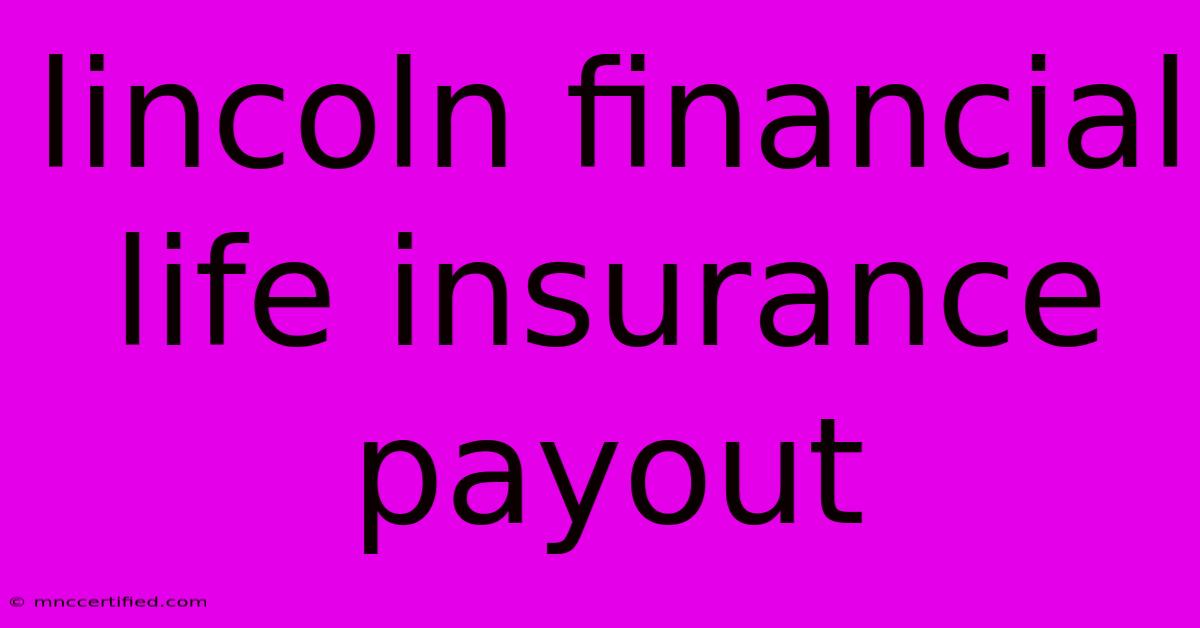Lincoln Financial Life Insurance Payout

Table of Contents
Understanding Lincoln Financial Life Insurance Payouts: What to Expect
Choosing the right life insurance policy is a crucial decision, and it's important to understand how payouts work before you commit. Lincoln Financial, a well-known and reputable insurance provider, offers a range of life insurance products. But what happens when it's time to claim your payout? This guide explores the Lincoln Financial life insurance payout process, explaining key factors to consider and what you can anticipate.
Types of Lincoln Financial Life Insurance and Their Payout Structures
Lincoln Financial offers a variety of life insurance policies, each with its own payout structure:
- Term Life Insurance: Term life insurance provides coverage for a specific period, often 10, 20, or 30 years. If the policyholder passes away during the term, a death benefit is paid to the beneficiary. The payout is usually a lump sum, and the policy has no cash value.
- Permanent Life Insurance: Permanent life insurance offers lifelong coverage and can accumulate cash value. There are two main types:
- Whole Life Insurance: Offers a fixed premium and guaranteed death benefit. The payout is typically a lump sum, but the policy can accumulate cash value that can be borrowed against or withdrawn.
- Universal Life Insurance: Offers flexible premiums and death benefit amounts. The payout is usually a lump sum, but the policy can accumulate cash value with interest that varies based on market performance.
Factors Affecting Lincoln Financial Life Insurance Payout
The amount you receive as a beneficiary will depend on several factors:
- Policy type: As mentioned above, different policy types have different payout structures.
- Death benefit amount: This is the amount you selected when you purchased the policy.
- Policy duration: If you have a term life policy, the death benefit is only payable if the policyholder passes away during the term.
- Outstanding premiums: Any outstanding premiums owed on the policy will be deducted from the death benefit.
- Policy riders: Certain policy riders, such as accidental death benefits, can increase the death benefit payout.
The Lincoln Financial Life Insurance Payout Process
Here's a general overview of the payout process:
- Notification of death: The beneficiary must notify Lincoln Financial of the policyholder's death, usually with a death certificate.
- Claim submission: The beneficiary will need to submit a claim form along with required documents.
- Verification: Lincoln Financial will verify the death and beneficiary information.
- Payout: Once the claim is approved, the death benefit will be paid to the beneficiary.
Note: The specific requirements and timeline may vary depending on the policy type and circumstances.
Contacting Lincoln Financial for Payout Information
If you have questions about your Lincoln Financial life insurance policy or payout process, you can contact them directly through:
- Their website: [Insert Website Link]
- Phone: [Insert Phone Number]
- Email: [Insert Email Address]
Key Takeaways
- Lincoln Financial offers a variety of life insurance products, each with its own payout structure.
- Payout amounts are determined by several factors, including policy type, death benefit amount, and policy duration.
- The payout process involves notifying Lincoln Financial of the death, submitting a claim, and verifying information.
By understanding the Lincoln Financial life insurance payout process, you can make informed decisions about your coverage and ensure a smooth experience for your beneficiaries.

Thank you for visiting our website wich cover about Lincoln Financial Life Insurance Payout. We hope the information provided has been useful to you. Feel free to contact us if you have any questions or need further assistance. See you next time and dont miss to bookmark.
Featured Posts
-
Internet Access Fuels Porn Addiction In North Korea
Nov 08, 2024
-
How Napoli Beat Tottenham With Osimhens Inspiration
Nov 08, 2024
-
Fed Meeting 25bps Cut Expected
Nov 08, 2024
-
How Much Is Composite Bonding Per Tooth
Nov 08, 2024
-
War Is Good For Business Invest Your Son
Nov 08, 2024